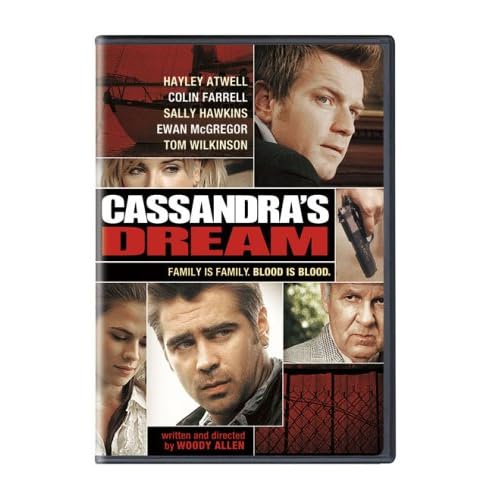

It's an annual hobby of many critics—myself included—to get neurotic about reviewing the latest Woody Allen film. Are we being too hard on it because we know the filmmaker is capable of more? Or too easy on it because of our affection for his earlier work? That we have to ask these questions is their own answer: Woody's on a seemingly irreversible downslide, the overrated Match Point notwithstanding. And now two years after Match Point, Allen delivers another London-set murder melodrama, with diminishing returns.
Ewan McGregor and Colin Farrell play Ian and Terry, working-class brothers whose family tie tightens and threatens to snap when they plan a murder together. Terry works in a garage and habitually accrues gambling debt; Ian, who works in their family's small-time restaurant, borrows "flash" cars from Terry's garage for hot dates and dreams of big business moves that will rewrite his ticket, from London to California. Desperation for money helps to create the circumstances for the murder, a crime that seems destined to be botched by the dim young strivers. But the strongest inciting emotion is their pathetic emotional need not to seem childish to their rich Uncle Howard (Tom Wilkinson). "Obviously," says expert guilt-tripper Howard, "Your idea of family is very different from mine."
At first all three men give stage performances with a camera a few feet away, but both the actors and the film become more interesting as the plot thickens. Still, it's late in the day to make a movie with dialogue that sounds lifted from a Clifford Odets play. "I'm just mad about the girl," says Ian, in reference to the actress (Hayley Atwell) whose expensive tastes he's overreaching to satisfy. In typical latter-day Allen fashion, Cassandra's Dream uses drama and myth as pretentious touchstones for the plot. Atwell's character in the play-within-the-movie philosophically noodles, "Life is nothing if not totally ironic," and the actress later makes the self-reflexive comment "The whole point of my character is to create erotic tension." Well, duh.
Then there's the matter of the title, which refers to the boat joint-owned by the brothers—a symbol of their sniffing after sweet success. Pointedly, their father comments, "Like the poet says, the only ship certain to come in has black sails." Portents of dead-end fate ("I think we make our own fate," Ian philosophizes) reach their apex when on the night of the murder, one character remarks, "That was then, and now is now. And it's always now." To hear the characters tell it, as surely as "The whole of human life is about violence," one oughtn't bet on a future one isn't guaranteed, one always just out of grasp ("One day you reach a point where there is no tomorrow"). Allen's persistent black musings get high-toned support from cinematographer Vilmos Zsigmond and composer Philip Glass.
Were this Allen's first word on the subject, Cassandra's Dream would be more palatable. But for a picture so concerned with fatalistic signs, a tale-told-out-of-school let slip by Ewan McGregor says it all. Seems Allen fell asleep on set during a lighting change. “He was leaning on his hand, and completely out for the count," said McGregor. "What we should have done was shot the scene.” It could happen to anyone, but then again, life is nothing if not totally ironic.

|
|
 |
Another year, another Woody Allen DVD. And as usual, Woody's latest gets a fine anamorphic transfer, but only a stereo track. The only bonus feature is subtitles—not even the film's trailer is included. Still, if you're like me, you won't want to be missing a Woody Allen picture in your collection, even a lesser effort like this one.